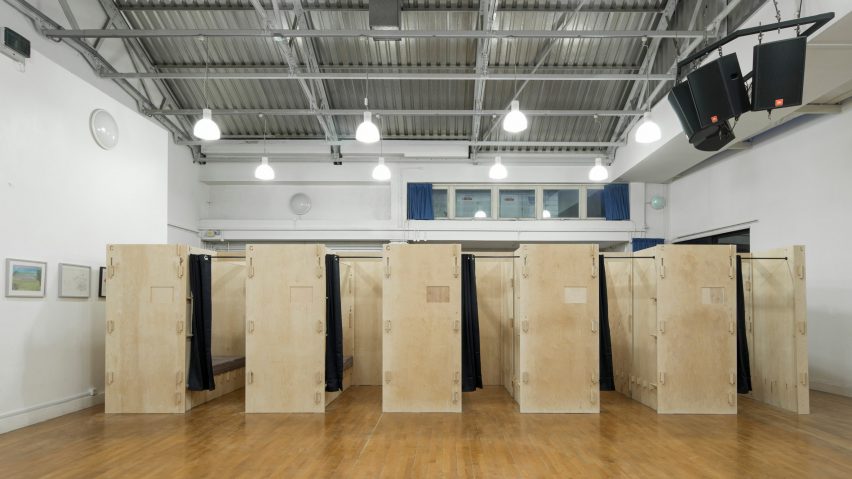Modular sleeping pods made from easy-to-assemble wooden panels are providing temporary accommodation for homeless people in London.
Ten of the prefabricated pods, designed by London-based architecture studio Reed Watts, have been installed inside the 999 Club night shelter in Deptford.
They offer secure, temporary accommodation to people who might otherwise be sleeping on the streets.
Reed Watts is also making the design available online through a Creative Commons license, so that anyone with the facilities will be able to reproduce additional pods and make them available to people in need.
Architect and Reed Watts co-founder Matt Watts hopes that other companies across the capital will offer up vacant spaces.
"By releasing the design as a royalty-free Creative Commons license, we hope to give as many organisations as possible an opportunity to use the pods where there is a need for short-term shelter," he said.
The project was initiated by a competition in 2017 hosted by the charity Commonweal Housing, which called for ideas to help Romanian migrant workers who were being forced to set up camp in public parks or underpasses.
These migrants are among an estimated 170,000 homeless people in the UK capital – equivalent to 1 in 52 people.
Reed Watts won the competition with its design for "low-tech pods" that can be easily installed in spaces such as school halls or disused buildings.
Prototype pods were previously installed in the 999 Club, as well as Housing Justice in Hillingdon, to allow the architects to test the concept. An adapted version of this design is the one that is now being rolled out.
Each pod consists of 18-millimetre-thick interlocking panels of fireproof birch plywood, which can be assembled by hand. Together they form an approximately cube-shaped structure, measuring 2.1 metres high, 2.1 metres long and 1.9 metres wide.
Every one comes with a mattress raised up on a platform that functions as a bed, a seat and a secure storage area. A curtain offers users the option of privacy.
The 10 in use at the 999 Club were constructed pro bono by local fabricator Aldworth James & Bond, using materials donated by Specialised Panel Products.
Other examples of sleeping pods have been proposed and trialled in cities around the world. For instance, bamboo micro homes were proposed for inside factories in Hong Kong, while a design from Bangkok envisioned light-filled cubes being installed in unfinished high-rises.
According to Tim Fallon, chief executive of the 999 Club, Reed Watts' pods are the first of their kind in the UK capital.
"They will provide very welcome privacy and a quiet space for people who come to our night shelter at their most vulnerable time," he said.
The design is currently on show at The Building Centre, as part of the Factory-Made Housing exhibition continuing until 18 January 2019.

